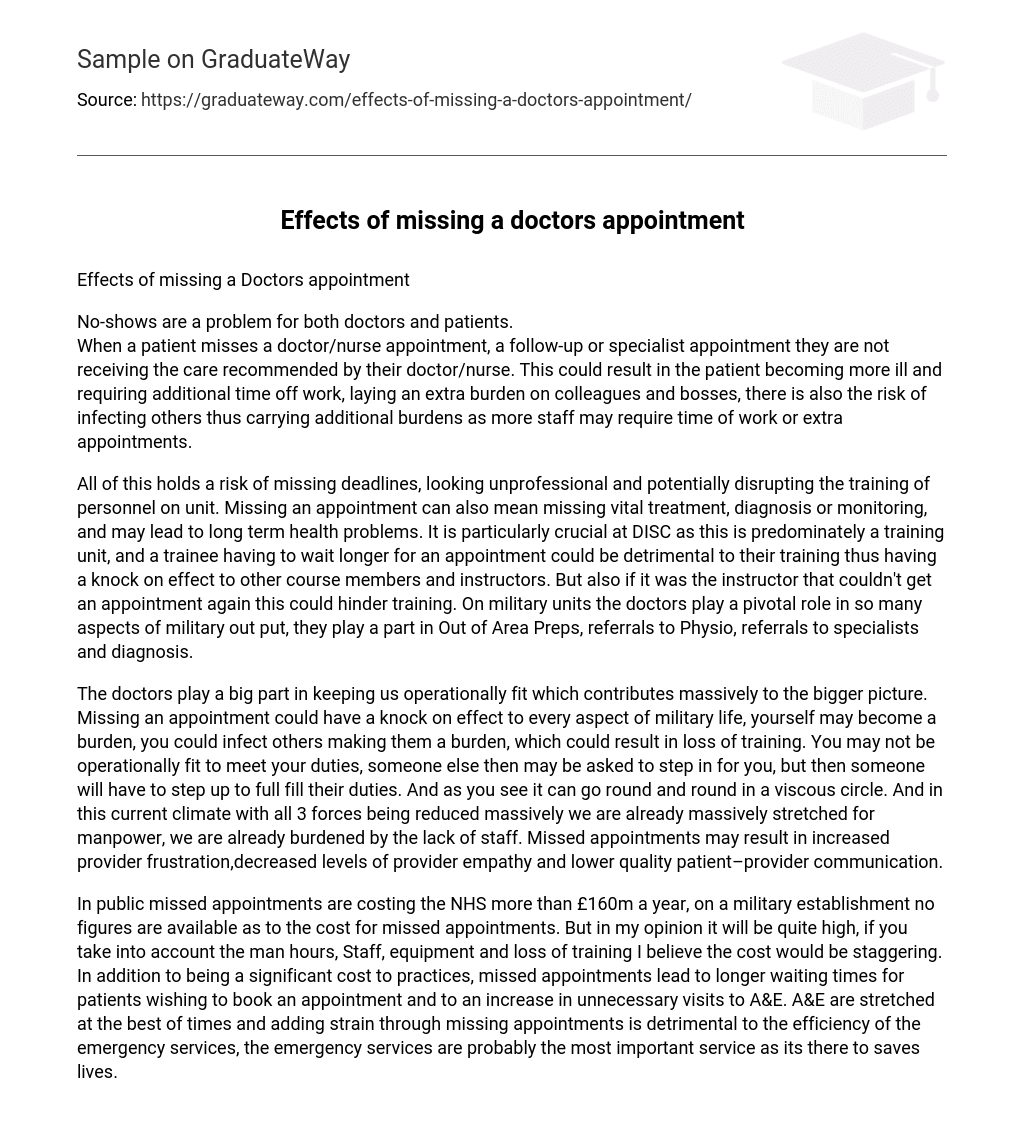Both doctors and patients face challenges with no-shows. When patients fail to attend appointments with healthcare providers, they miss out on necessary care. This can lead to worsening health conditions and increased time off work, causing additional strain on coworkers and supervisors. Moreover, there is a potential for spreading infections to others, which can further burden staff members who may require additional time off or appointments.
Missing deadlines, looking unprofessional, and potentially disrupting personnel training are all risks associated with this situation. Not attending appointments can result in missing vital treatment, diagnosis, or monitoring, which can lead to long-term health issues. This is especially critical at DISC, a training unit, where delays in appointments can negatively impact trainees’ training and consequently affect other members and instructors. Additionally, if an instructor is unable to get an appointment, it could impede training. The doctors on military units have a crucial role in various military activities such as Out of Area Preps, referrals to physio and specialists, and diagnosing medical conditions.
The importance of doctors in maintaining our operational fitness is essential for achieving our overall goals. Not attending a doctor’s appointment can have several negative impacts on military life. It can personally burden you and potentially spread infection to others, making them burdens as well and resulting in a loss of training. Moreover, if you are unfit for duty, someone else may need to assume your responsibilities, causing a domino effect. Currently, all three forces are facing significant manpower reduction, which is already straining due to insufficient staff. Missed appointments may increase frustration among healthcare providers, reduce empathy towards patients, and diminish the quality of communication between patients and healthcare providers.
The NHS incurs a cost of over £160m per year in the public sector due to missed appointments, and there are no available figures for the cost of missed appointments on a military establishment. However, I believe that this cost would be significant considering factors such as man hours, staff, equipment, and loss of training. The resulting expense could be staggering. Missed appointments not only burden healthcare practices financially but also contribute to longer waiting times for patients seeking appointments. This leads to an increase in unnecessary visits to the emergency room, which puts additional strain on already stretched emergency services. The efficiency of these vital services is negatively impacted by the added pressure from missed appointments, as they play a critical role in saving lives.
There is currently a campaign targeting individuals who overcrowd A&E with conditions that could be treated by their GP. However, if they are unable to get an appointment, they may feel forced to seek emergency care. This leads to patients with scheduled GP appointments not attending, resulting in wasted time, financial loss, and increased strain on emergency services.
While a patient may have a valid reason for missing an appointment, the overall impact of multiple no-shows is significant for medical practices. If individuals cannot attend their appointments for any reason, they should cancel or reschedule them so that others can take the slots. Ultimately, it boils down to demonstrating common courtesy. We all comprehend the frustration when someone fails to show up as expected.
The NHS is contemplating imposing fines on those who miss appointments as both a deterrent and a means of recouping some of the wasted expenses.
There is a lot of debate about whether to implement a system to reduce missed appointments in the NHS. The NHS argues that it goes against their values and would require a large initial investment. However, many General Practitioners (GP’s) support the system because they believe it would help ease their workload caused by a growing population. Doctors are often overwhelmed with patients, so every appointment slot is important. In order to manage this, GP’s have had to discharge patients who frequently miss appointments, which leads to complaints and more work for the surgery staff and doctors. Additionally, when these patients reapply for registration at the same or different surgery, it requires significant manpower. Research on this topic has shown that even one missed appointment can have negative impacts on various factors and services.
In the NHS, a texting service is crucial for reminding patients of their appointments. This is more cost-effective than dealing with missed appointments. However, implementing such a system in the military is unlikely due to restrictions and budget constraints. Missed appointments in the military can be attributed to poor administration, last-minute deployments, compassionate leave, or work/training commitments. I believe these reasons are valid except for “bad administration.” Individuals can address this issue by using personal reminders such as diaries, alarms on phones or computers, or writing reminders on visible boards or paper. Personally, I deeply regret missing an appointment and apologize for any inconvenience caused. I will make every effort to ensure that this does not happen again because it wastes time, money, resources and essential manpower which we cannot afford.
When a patient does not show up for their appointment, it means that another patient misses out on an opportunity.





